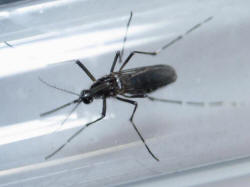|
 Senate
set to approve $1.1 billion in Zika virus funding Senate
set to approve $1.1 billion in Zika virus funding
 Send a link to a friend
Send a link to a friend
[May 18, 2016]
WASHINGTON (Reuters) - The U.S.
Senate on Tuesday cleared the way for approval of $1.1 billion in
immediate funds to battle the Zika virus that is linked to birth
defects, well above what is in legislation pending in the House of
Representatives.
|
|
 By a vote of 68-29, senators limited debate on the measure, paving
the way for likely Senate approval this week. Two other funding
approaches failed to get enough support to advance in the Senate. By a vote of 68-29, senators limited debate on the measure, paving
the way for likely Senate approval this week. Two other funding
approaches failed to get enough support to advance in the Senate.
Meanwhile, the White House threatened to veto a $622.1 billion Zika
bill poised to pass the House of Representatives later this week,
saying it was "woefully inadequate."
Unlike the Senate legislation, the House bill also requires that the
$622.1 million be fully offset with spending cuts elsewhere.
Many conservative Republicans in the House refuse to approve Zika
funds that would add to federal budget deficits, while Democrats and
some Senate Republicans favor treating the problem as an emergency
that would not have to be financed with spending cuts.

Republican Senator Roy Blunt from Missouri told reporters that the
Senate measure "trimmed this package back (from Obama's request) to
what really addresses the emergency at the time."
Democratic Senator Patty Murray from Washington, who crafted the
legislation with Blunt, added, "We are going to need to keep the
pressure on House Republicans to set aside their partisan bill and
actually get the administration the emergency resources they need."
It was unclear how long it might take the Senate and House to work
out their differences once they pass their respective bills.
U.S. health officials have concluded that Zika infections in
pregnant women can cause microcephaly, a birth defect marked by
small head size that can lead to severe developmental problems in
babies. The World Health Organization has said there is strong
scientific consensus that Zika can also cause Guillain-Barre, a rare
neurological syndrome that causes temporary paralysis in adults.
[to top of second column] |

Last year, Brazil began detecting an increase in microcephaly and
the virus has been spreading rapidly in the Americas, with new cases
now being reported in warm climates in southern U.S. states
including Florida.
House Republicans argue their $622.1 billion bill, when coupled with
$589 million the Obama administration already shifted to Zika from
unused funds to battle Ebola, would provide enough money through
Sept. 30, the end of this fiscal year.
The administration says it needs the emergency funds to help state
and local governments eradicate mosquitoes that spread the virus and
to develop a vaccine.
(Reporting By Richard Cowan and Timothy Gardner; Editing by Paul
Simao and Bernard Orr)
[© 2016 Thomson Reuters. All rights
reserved.] Copyright 2016 Reuters. All rights reserved. This material may not be published,
broadcast, rewritten or redistributed.

 |